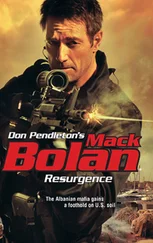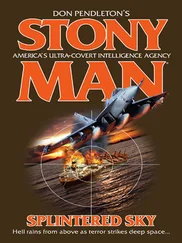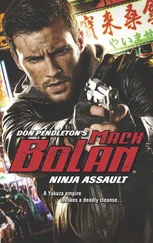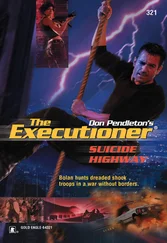“THIS IS A SURPRISE, NUNG,” BROGNOLA SAID
“I am here to do you a favor,” the man said.
“Really?” Brognola was not going to insult the man’s intelligence by claiming to be a minor functionary in the Justice Department.
“Your team did exceptionally well in Caracas.”
“I see,” Brognola said. It was surprising that Nung had so readily admitted to Chinese involvement.
“The world is a very complicated place, Mr. Brognola. It is my job to help guide my country through treacherous political waters. I understand well that you and I share similar vocations which often put us on different sides of the same issue.”
“But not in this case?”
“My superiors do not believe that a second attack of the magnitude of 9/11 would be advantageous to our relationship. A shift toward more conservative political thought by your nation could only serve to strain our national interactions.”
Brognola felt a cold chill surge through his body. “You have knowledge of a planned attack on the American homeland?”
High Assault
Don Pendleton’s
Stony Man ®
America’s Ultra-Covert Intelligence Agency
 www.mirabooks.co.uk
www.mirabooks.co.uk
HIGH ASSAULT
CHAPTER ONE
CHAPTER TWO
CHAPTER THREE
CHAPTER FOUR
CHAPTER FIVE
CHAPTER SIX
CHAPTER SEVEN
CHAPTER EIGHT
CHAPTER NINE
CHAPTER TEN
CHAPTER ELEVEN
CHAPTER TWELVE
CHAPTER THIRTEEN
CHAPTER FOURTEEN
CHAPTER FIFTEEN
CHAPTER SIXTEEN
CHAPTER SEVENTEEN
CHAPTER EIGHTEEN
CHAPTER NINETEEN
CHAPTER TWENTY
CHAPTER TWENTY-ONE
CHAPTER TWENTY-TWO
CHAPTER TWENTY-THREE
CHAPTER TWENTY-FOUR
CHAPTER TWENTY-FIVE
CHAPTER TWENTY-SIX
CHAPTER TWENTY-SEVEN
October 25, 2007—Beirut, Lebanon
The massive Lockheed L-100 cargo plane circled above the night-shrouded landscape with the relentless patience of a vulture, its four heavy Allison T56-A-15 turboprop engines droning steadily.
From within the civilian version of the C-130E Hercules, Brigadier General Abdul-Ali Najafi watched the operation unfolding below him with the detached scrutiny of the consummate puppet master. Inside the insulated interior cabin, he reclined in an expensive leather wingback chair purchased at Nigel’s of London. In front of him rose a stack of HD television monitors fed from glasses-mounted, POV digital cameras that routed their signal through a booster unit in the ground-operations vehicle.
The images flickering on the screen were chaotic and jumbled as the strike team conducted its mission preparations. Najafi glimpsed the barrels of folding-stock Kalashnikovs, the dashboard of the big black Suburban SUV the hit squad was operating from and the masked faces of the unit. Through the windshield Najafi could just make out the urban residential street along which the target passed each day from work to home.
Najafi leaned forward and hit a key on his laptop. He spoke into the microphone. “Adjust focus,” he ordered.
The gunner wearing the headset lifted a hand encased in a black Lycra driver’s glove from the pistol grip of his weapon, and the image on the screen shifted as he worked the attachment. The resolution on the display screen sharpened.
“Very good,” Najafi said and leaned back into his chair.
From behind him he heard the door to the Lockheed’s tactical operation center open. Najafi knew without checking that it was his executive officer, Colonel Ayub. Ayub had come up through the regular Iranian army, but through family connections on the Revolutionary Council he had managed to secure the coveted posting as Najafi’s assistant.
“Do you have it?” Najafi demanded.
“Yes,” Ayub answered.
Najafi held up his hand, gesturing toward a clear spot on the table in front of him. His nails were manicured, and a gold Rolex Diplomat luxury watch was fitted onto a slender wrist. There was a heavy band of white gold on his ring finger, along with a silver-and-platinum signet ring on his index finger.
“Put it there,” he ordered.
Ayub stepped forward away from the TOC’s central door and around the dentist’s chair secured incongruously in the middle of the control room. He lifted a Schlesinger leather attaché case and set it down. The valise cost a thousand dollars, which Colonel Ayub knew because he had purchased both the case and the item it held on a recent shopping excursion in Tbilisi, Georgia, while doing business with certain Russian bankers in that city.
Beneath his dusky complexion Ayub paled as he looked at the screens. His eyes slid from the monitors to the wingback chair then back to the attaché case before coming to rest on the HD monitors again. His tongue flickered out to moisten his lips under a thin mustache. He released the handle of the case and stepped back.
On the screen there was a sudden flurry of motion. The team leader’s arm came up and pointed across his body out the passenger window. The man barked a command into his microphone that was clearly audible through the TOC’s sound system. Like dominoes falling in succession, the pictures on the screens of the monitor array flickered to life as one by one the other team members initiated their cameras.
“Now we’re moving,” Najafi murmured.
The commander drew a slim white cylinder of a fashionable Turkish cigarette from an open pack in his shirt pocket. Ayub responded without thinking, removing the lighter and stepping forward to light the cigarette as Najafi inclined his head.
Gray smoke billowed up in front of the screens. On the monitors, balaclava hoods were pulled into place, turning the hard-eyed killers into anonymous androids. The interior of the vehicle seemed filled with the muzzles of weapons.
Colonel Ayub let his breath out in a slow, controlled hiss and prayed Najafi couldn’t hear.
MICHAEL SULEIMAN looked out at the passing street through the bulletproof glass of his limousine’s rear windows. He watched, lost in thought, as the tall buildings of Beirut’s business district gave way to more residential neighborhoods as they drove up toward the hills east of the city.
In the car beside him, his wife, Suha, read from a children’s book to his four-year-old daughter, Taraneh. The little girl had her mother’s dark brown eyes and smooth olive complexion, as well as her keen intelligence. Michael Suleiman was always amazed by Suha’s insights, even after fifteen years of marriage. In his private moments he doubted seriously if he could have risen to power so smoothly in the Kataeb Party without her support.
His eyes slid past the scars of war left over from the violence of civil unrest dating as far back as the 1980s, despite the reconstruction efforts of more recent years. What his eyes couldn’t ignore were the piles of rubble left over from the sectarian violence following the 2006 incursion by the Israeli Defense Forces.
Unconsciously, Suleiman frowned at the thought. Despite international pledges to the contrary, that cross-border assault had only strengthened the hand of Iran in Lebanon, through their proxy puppets—Hezbollah.
In parliament, Suleiman had been using all the leverage he could muster to fight that Iranian influence in his homeland. It was this bitter opposition that had, in no small part, resulted in his newfound need for armed bodyguards.
Four soldiers armed with M-4 carbines drove a scout vehicle ahead of his limo, and even now one of the American-trained protection specialists rode with him, sitting next to his seven-year-old son, Ephraim, listening patiently as the young boy explained the intricacies of whatever new game he was playing on his handheld game system.
Читать дальше
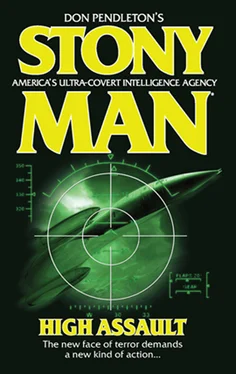
 www.mirabooks.co.uk
www.mirabooks.co.uk




